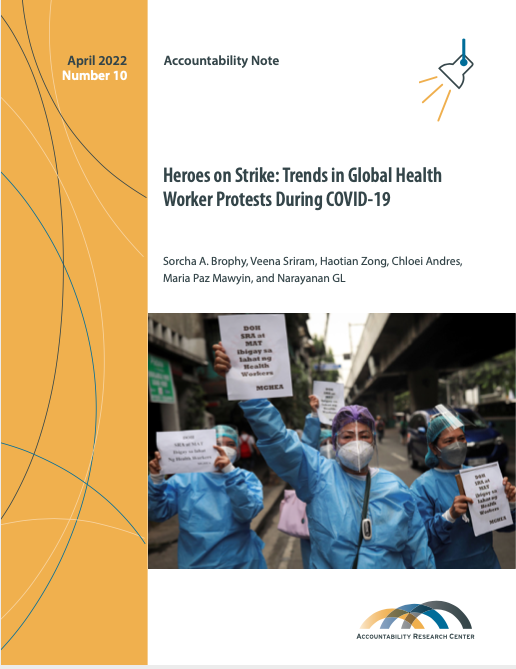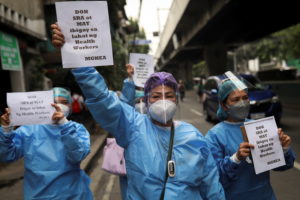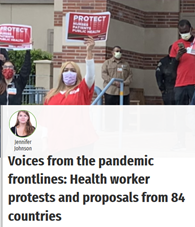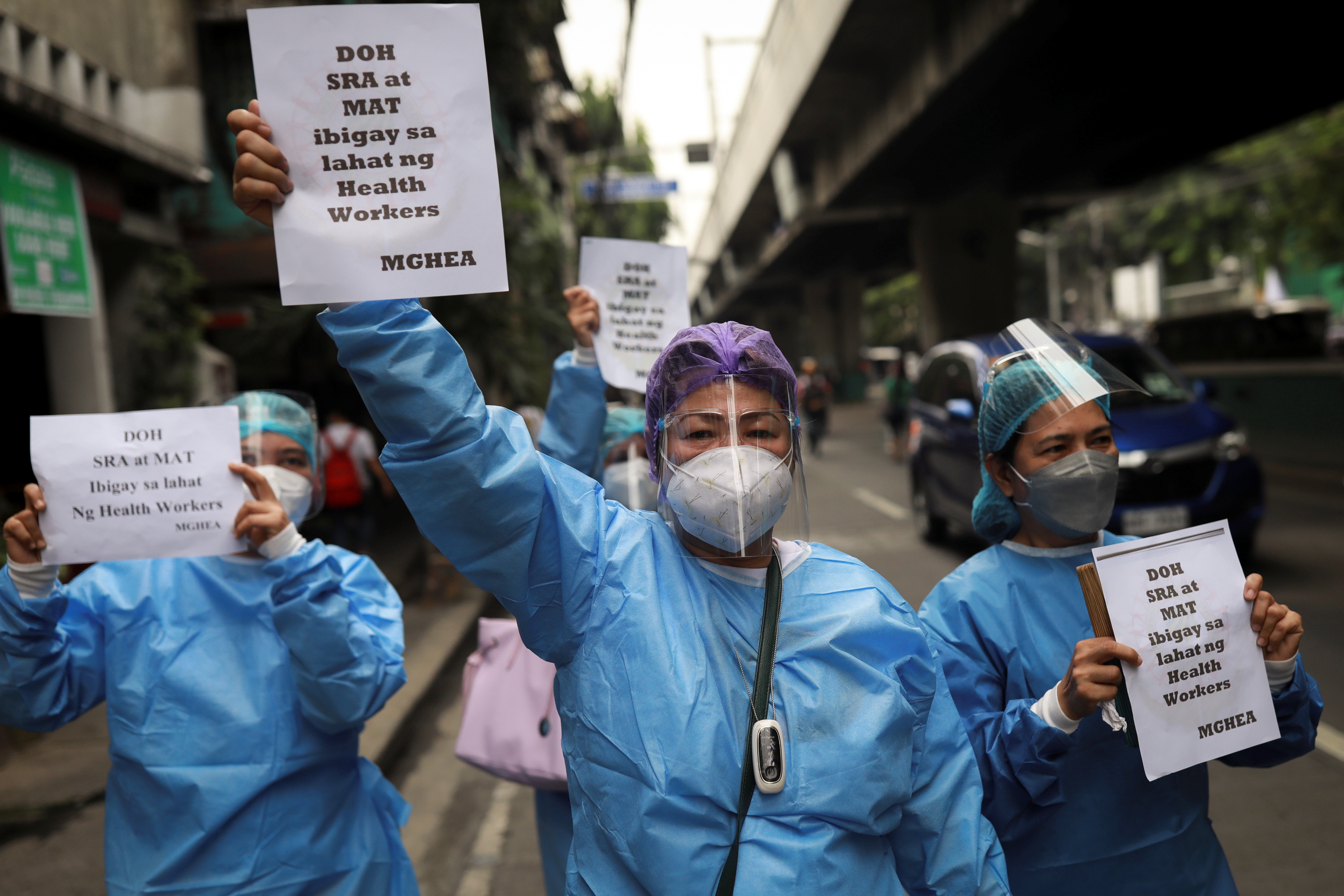
Heroes on Strike: Trends in Global Health Worker Protests During COVID-19
Date: April 2022
Author(s): Sorcha A. Brophy, Veena Sriram, Haotian Zong, Chloei Andres, Maria Paz Mawyin, and Narayanan GL
Publication type: Accountability Note
Published by: Accountability Research Center
This Accountability Note describes global trends in health worker protests between March 11, 2020 and March 10, 2021. We argue that the frequent characterization of health workers as heroes of the pandemic obscures the fact that health workers themselves describe the challenges they face during this time as violations of their rights as workers, highlighting the obligations of their employers to provide working conditions and remuneration that justify the risk they assume. Using data from the Armed Conflict Location & Event Data (ACLED) Project, we first provide a global overview of the growth in health worker protest activity in the March 2020–2021 period as compared to the March 2019–2020 period. Health workers engaged in protest activity with greater frequency during the first year of the pandemic than during the prior year. The eighty-five countries included in the ACLED data set in both the March 2019–2020 period and the March 2020–2021 period experienced a sixty-two percent increase in health worker protest activity (from 2416 protests to 3913 protests). We then provide an overview of the content of the 6589 health worker protests in the ACLED dataset between March 2020 and March 2021, describing protests in 149 countries in terms of five categories: working conditions and remuneration, resources, health system delivery issues, public policy, and other. By far, the largest category of protests during this period are those related to working conditions and remuneration. Approximately sixty-six percent (N=4358) of global protests in the 2020–2021 period expressed health worker dissatisfaction about issues such as: occupational hazards, unpaid wages, risk allowances and job security. Surprisingly, personal protective equipment (PPE) concerns—an issue covered frequently in the media—motivated a relatively low percentage of the protests (less than nine percent). We note this not to downplay the gravity of global PPE shortages, but to situate PPE shortages as one among many health worker concerns during the pandemic. Protests initiated by health workers about health system delivery issues provide an important reminder that even in the middle of a pandemic, not everything was about COVID-19. Sixty-two percent of the health system-related protests during the 2020–2021 period were about issues that were not coded as directly related to the COVID-19 pandemic. Similarly, the vast majority of health workers’ protests around public policy were not about pandemic-related government policy, but about social issues like climate change, immigration, police brutality, and elections. The aim of this analysis is to understand what health workers advocated for during a time of immense pressure, and to identify some broad areas of concern for health sector accountability. Through this analysis, we prepare the groundwork for future research and action, and share preliminary guidance regarding how health sector stakeholders—including government, health worker associations, unions, and civil society—might develop improved systems of accountability.

Healthcare workers hold a protest outside the Philippines’ Department of Health, demanding better wages and benefits amid rising coronavirus disease (COVID-19) infections, in Manila, Philippines, September 1, 2021. REUTERS/Eloisa Lopez – RC2OGP9E541B
Sorcha Brophy is an Assistant Professor in the Department of Health Policy and Management at the Mailman School of Public Health, Columbia University. Dr. Brophy is an organizational sociologist who explores the challenges organizations face as they create ethics policies. Her current research agenda focuses on politics within professional medical associations and on global health worker protests. Dr. Brophy is also conducting research on state politics around the provision of health care for foster youth. Her work has been published in management, policy, and sociology outlets including the Journal of Professions and Organization, Health Affairs, Sociology of Religion, and the Journal of Health Politics, Policy and Law. Veena Sriram is an Assistant Professor with a joint appointment in the School of Public Policy and Global Affairs and the School of Population and Public Health at the University of British Columbia. Her research focuses on understanding power and politics in health policy processes, with a focus on health workforce and governance. She has conducted research at the national and state level in India, exploring a range of health policy and system questions, including medical specialization, health workforce policy development, the functioning of national health authorities and emergency care systems. Her work has been published in Social Science and Medicine, Health Policy and Planning and the Journal of Health Politics, Policy and Law. Haotian (Tony) Zong is a B.S. student in Statistics and Economics at the University of Chicago. Maria Paz Mawyin completed her BA in Political Science at the University of British Columbia. Chloei Andres is a Masters of Public Policy and Global Affairs student at the University of British Columbia. Narayanan (Hari) Gopalan Lakshmi is a Masters of Public Policy and Global Affairs student at the University of British Columbia.


